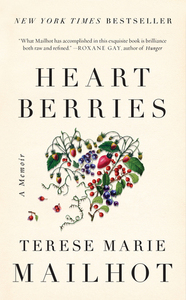Take a photo of a barcode or cover
A woman's wrangling with modern, white definitions of and expectations from mental health. Good writing, but I kept waiting for it, for something, to really sparkle and stand out.
dark
emotional
reflective
sad
medium-paced
challenging
dark
emotional
reflective
sad
tense
medium-paced
challenging
dark
emotional
reflective
fast-paced
Terese Marie Mailhot’s Heart Berries is a memoir that resists easy categorization—a fragmented, poetic, and searingly intimate meditation on survival, identity, and the complicated act of telling one’s own story. With prose that feels like both an offering and a demand, Mailhot unravels the layers of pain, memory, and inheritance that shape her existence as an Indigenous woman in a world that would rather forget her.
Mailhot documents her struggles with mental illness, her fraught relationships, and the impossible expectations placed upon Indigenous women, particularly in the realm of storytelling. She is not interested in neat narratives or palatable resolutions. Instead, she leans into the tension between personal truth and collective history, resisting the impulse to explain or justify. Her words cut with precision: “Indian girls can be forgotten so well they forget themselves.” That forgetting—forced, inherited, and sometimes willed—is at the heart of her story.
The memoir traces Mailhot’s time in an in-patient psychiatric hospital, her diagnosis of PTSD, bipolar disorder, and an eating disorder, and her tumultuous relationship with her white creative writing professor, Casey. The power imbalance in their relationship mirrors the broader structures of colonial violence, as Mailhot is forced to navigate both love and exploitation in a space where she is perpetually undervalued. Her struggles with motherhood, memory, and psychiatric care are deeply entangled, revealing how Western institutions fail Indigenous women, offering treatment without understanding, structure without care.
While Mailhot’s reflections on race, gender, and power are striking, Heart Berries is, at its core, a story of relationship dysfunction—one that often reads as a meditation on longing, self-destruction, and unreciprocated devotion. As someone who does not gravitate toward romance-heavy narratives, I found myself frustrated by how much of the book was consumed by Mailhot’s agony over Casey, rather than the sharper interrogations of colonialism and intergenerational trauma that surface throughout. Additionally, childhood sexual abuse is one of my primary triggers, and the lack of content warnings made certain sections difficult to engage with.
Despite these reservations, Heart Berries is undeniably powerful in its form and execution. Mailhot’s writing is unflinching, lyrical, and immersive, a refusal to be easily understood or consumed. Though the memoir was not for me, its rawness and vulnerability are undeniable, making it an essential read for those seeking a voice that refuses to be silenced.
📖 Read this if you love: raw and poetic memoirs, nonlinear storytelling, and explorations of Indigenous womanhood.
🔑 Key Themes: Reclaiming Narrative and Voice, Intergenerational Trauma, Mental Illness and Survival, Race and Gender in Intimacy, The Limits of Western Healing Frameworks.
Graphic: Mental illness, Toxic relationship, Forced institutionalization, Suicide attempt
Moderate: Child abuse, Incest, Pedophilia, Sexual assault
Minor: Alcoholism, Drug use, Eating disorder, Infidelity, Self harm, Suicidal thoughts, Suicide, Abortion, Death of parent
The sexual assault, incest, and pedophilia content warnings are in relation to a description of incestual childhood sexual abuse. This description occurs on page 109.
dark
emotional
hopeful
fast-paced
This memoir is raw and devastating in its honesty. This is written with depth and lyrical prose. The prose is sprinkled throughout with insights into what defines us finally as adult survivors of trauma. Mailhot, a First Nation Canadian writer, deals with her mental health issues and subsequent diagnoses head on and does not shy away from the truth of her life spent searching for answers about her personal identity. It is her life laid bare, without shame and for that I give this 5 stars. This is brave stuff. This is for women who have known abuse, neglect, and pain. Who have felt invisible within a social and judicial system that often overlooks them. It is for the scores of MMIWG in North America. It is for women who've never truly felt safe being themselves, especially with men and lovers who've taken too much, yet given little in return. Sisters all.
I began reading late last night and only managed a few pages before falling asleep. This morning I sped through, highlighting passages, until I finished a few hours ago. It is not always an easy read as some of the prose is not chronologically linear, yet these words need to be absorbed slowly, as they are often dark and sorrowful. However, if you read it as you would inspect old Polaroid pictures of a life once lived, juxtaposed with recent snapshots of the woman and exquisite writer that she is, you've got a true gem of a memoir.
I began reading late last night and only managed a few pages before falling asleep. This morning I sped through, highlighting passages, until I finished a few hours ago. It is not always an easy read as some of the prose is not chronologically linear, yet these words need to be absorbed slowly, as they are often dark and sorrowful. However, if you read it as you would inspect old Polaroid pictures of a life once lived, juxtaposed with recent snapshots of the woman and exquisite writer that she is, you've got a true gem of a memoir.
This was a hard read and does not translate to a five point scale. “Poetic memoir” is a good description. I’m glad I read it. Close to experiencing being inside a troubled mind/body, and feeling the wreckage of a wrecked childhood.
challenging
dark
emotional
reflective
sad
tense
medium-paced
Minor: Child abuse, Domestic abuse, Racism, Rape, Suicide, Suicide attempt
challenging
dark
emotional
funny
hopeful
inspiring
sad
fast-paced







